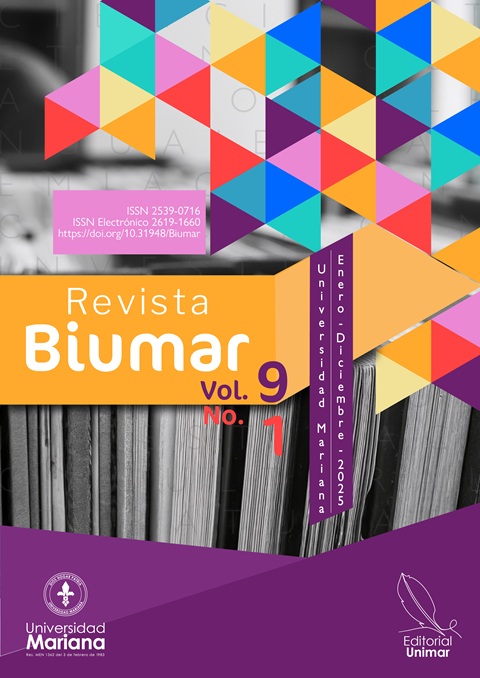Self-regulation of media consumption among students at the Institución Educativa Alquería de la Fragua
DOI:
https://doi.org/10.31948/rb.v9i1.5012Keywords:
media consumption, digital self-regulation, critical reading, social media, literacy, TikTok, emotional well-being, education, critical thinkingAbstract
This research study involved 32 secondary school students from the Institución Educativa Alquería de la Fragua with the aim of promoting self-regulation of media consumption and strengthen critical digital reading skills. To achieve this, a qualitative approach was adopted, which included the use of a questionnaire, focus groups, and participatory workshops. It was found that cell phones are the primary access device (94%), and that TikTok and WhatsApp serve as emotional refuge spaces, which shows low self-regulation and negative effects on health, academic performance, and interpersonal relationships. However, there was also evidence of a growing awareness of the accuracy of information and the impact of algorithms. The intervention created safe spaces for dialogue, encouraging reflection, critical thinking, and the adoption of strategies for conscious use. In this context, it can be concluded that effective regulation requires the active involvement of teachers and families, the incorporation of media education into the curriculum, and the promotion of creating original content that enhances learning.
Author Biographies
Beatriz Elena Guerrero Corpas, Corporación Universitaria Minuto de Dios
Licenciada en Educación Básica
Yarid Ivette Portilla Castro, Corporación Universitaria Minuto de Dios
Nutricionista Dietista
Marcos David Jimenez Castañada, Corporación Universitaria Minuto de Dios
Teólogo
Wilson Enrique León Suarez, Corporación Universitaria Minuto de Dios
Matemático
Jhon Jairo Rico Mendoza, Corporación Universitaria Minuto de Dios
Ingeniero Industrial
Efren de Jesus Monterroza Montes, Corporación Universitaria Minuto de Dios
Licenciado en Física
References
Arab, E. y Díaz, A. (2015). Impacto de las redes sociales e internet en la adolescencia: aspectos positivos y negativos. Revista Médica Clínica Las Condes, 26(1), 7-13. https://doi.org/10.1016/j.rmclc.2014.12.001 DOI: https://doi.org/10.1016/j.rmclc.2014.12.001
Buckingham, D. (2019). Teaching media in a 'post-truth' age: fake news, media bias and the challenge for media/digital literacy education / La enseñanza mediática en la era de la posverdad: fake news, sesgo mediático y el reto para la educación en materia de alfabetización mediática y digital. Culture and Education, 31(2), 213-231. https://doi.org/10.1080/11356405.2019.1603814 DOI: https://doi.org/10.1080/11356405.2019.1603814
Hernández, R. y Mendoza, C. (2018). Metodología de la investigación: rutas cuantitativa, cualitativa y mixta. McGraw Hill Education.
Livingstone, S., & Helsper, E. (2007). Gradations in digital inclusion: children, young people and the digital divide. New Media & Society, 9(4), 671-696. https://doi.org/10.1177/1461444807080335 DOI: https://doi.org/10.1177/1461444807080335
Odira. (2020, 4 de abril). Zoom -Istvan Banyai - Cuento Siliente [Video]. You Tube. https://www.youtube.com/watch?v=IxkLdLeIHiw
Organización para la Cooperación y el Desarrollo Económicos (OECD). (2021). 21st-Century Readers: Developing Literacy Skills in a Digital World. OECD Publishing.
Organización de las Naciones Unidas para la Educación, la Ciencia y la Cultura (Unesco). (2024). Informe de seguimiento de la educación en el mundo: informe sobre género - La tecnología en los términos de ellas. Unesco.
Patton, M. Q. (2015). Qualitative Research & Evaluation Methods. Sage.
Stake, R. E. (1994). Case studies. En N.K. Denzin y Y.S. Lincoln (Eds.). Handbook of qualitative research (pags. 236-247). Sage Publications.
Turkle, S. (2011). Alone Together: Why We Expect More from Technology and Less from Each Other. Basic Books.
Twenge, J. (2017). iGen: Why Today's Super-Connected Kids Are Growing Up Less Rebellious, More Tolerant, Less Happy and Completely Unprepared for Adulthood. Atria Books.
How to Cite
Downloads
Downloads
Published
Issue
Section
License
Copyright (c) 2025 Beatriz Elena Guerrero Corpas, Yarid Ivette Portilla Castro, Marcos David Jimenez Castañada, Wilson Enrique León Suarez, Jhon Jairo Rico Mendoza, Efren de Jesus Monterroza Montes

This work is licensed under a Creative Commons Attribution 4.0 International License.
Revista Biumar es publicada por la Editorial UNIMAR de la Universidad Mariana bajo los términos de la licencia Creative Commons Reconocimiento 4.0 Internacional (CC BY 4.0)






